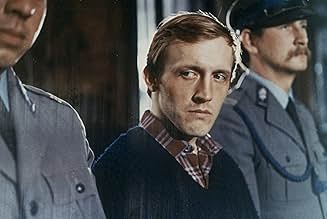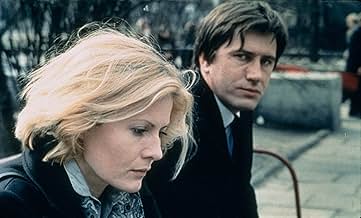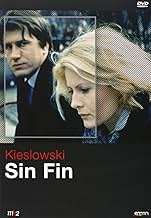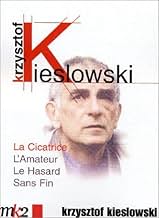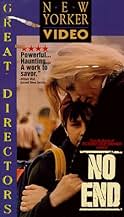IMDb RATING
7.3/10
6.1K
YOUR RATING
The wife of the recently deceased lawyer tries to cope with grief after his loss and to keep his last case going in court.The wife of the recently deceased lawyer tries to cope with grief after his loss and to keep his last case going in court.The wife of the recently deceased lawyer tries to cope with grief after his loss and to keep his last case going in court.
- Director
- Writers
- Stars
Danny Webb
- American
- (as Daniel Webb)
Jacek Domanski
- Dzialacz opozycji
- (uncredited)
- Director
- Writers
- All cast & crew
- Production, box office & more at IMDbPro
Featured reviews
I've began to follow Kieslowski over the past days, hoping to finally encounter his color films which I've seen for years pop up among the brilliant works. I watched this as background glimpse into his formative period. Interestingly he does two things:
One is he presents a world that has come undone and carries the past. A woman, her husband has died as the film begins, life has broken down and she has to go out and face it. Everything that she encounters is an echo from the past. Two instances that involve photos exemplify it; nude photos of her that her husband had found but he's now gone before she had a chance to explain, the other shows an idyllic summer that he possibly spent with another woman (before they met?). But also an old friend who now vies for her, a night of prostituting herself because he reminds her of her husband, being hypnotized to forget him conjures his presence, and round it goes from bewilderment to epiphany.
The other thing they do here is look to frame a response to bewilderment felt by Poles who had just been through strikes and martial law. A man is awaiting trial, different narratives are offered up by lawyers. Should he be pragmatic or protest? It's one of the threads that were left undone at the time of the husband's death who was a lawyer on the case. His own advice, which I perceive to be Kieslowski's, is for everyone to remove the distortions that prevent them from seeing each other.
Viewers who are content to encounter a life of episodic confusion will be happy with what he does. I miss a more penetratingly visual way of threading these events and, already from my brief glimpses into Dekalog, I believe it's this ability to surround and submerge causality that he's going to cultivate, a way of dreaming in advance. Here, tellingly, we have the husband announcing his own death in the very first shot whereas it could have been threaded as discovery and glimpsed in a haze (he already tries this by the first episode of Dekalog).
One is he presents a world that has come undone and carries the past. A woman, her husband has died as the film begins, life has broken down and she has to go out and face it. Everything that she encounters is an echo from the past. Two instances that involve photos exemplify it; nude photos of her that her husband had found but he's now gone before she had a chance to explain, the other shows an idyllic summer that he possibly spent with another woman (before they met?). But also an old friend who now vies for her, a night of prostituting herself because he reminds her of her husband, being hypnotized to forget him conjures his presence, and round it goes from bewilderment to epiphany.
The other thing they do here is look to frame a response to bewilderment felt by Poles who had just been through strikes and martial law. A man is awaiting trial, different narratives are offered up by lawyers. Should he be pragmatic or protest? It's one of the threads that were left undone at the time of the husband's death who was a lawyer on the case. His own advice, which I perceive to be Kieslowski's, is for everyone to remove the distortions that prevent them from seeing each other.
Viewers who are content to encounter a life of episodic confusion will be happy with what he does. I miss a more penetratingly visual way of threading these events and, already from my brief glimpses into Dekalog, I believe it's this ability to surround and submerge causality that he's going to cultivate, a way of dreaming in advance. Here, tellingly, we have the husband announcing his own death in the very first shot whereas it could have been threaded as discovery and glimpsed in a haze (he already tries this by the first episode of Dekalog).
What has been seen of Krzysztof Kieslowski (almost all his films and 'Dekalog' in its entirety) all ranges between very good (the 8th episode of 'Dekalog') to masterpiece ('Three Colors: Red' and 'Blue' and the whole 'Dekalog' series). To me, he was an immensely gifted director, who died far too early.
'No End' is not one of Kieslowski's best, but like 'Camera Buff' it is another early film of his that deserves more love and attention. It may be alienating and strange to some viewers (its, as reasoned, pro-solidarity sentiments must have been reason enough for it to not be released internationally for over a year) and his more international work is somewhat more accessible. However, while some of the political story could have had more clarity in places, 'No End' is great in many ways with all the typical Kieslowski strengths that make his films so good.
As was always the case in Kieslowski's work, 'No End' is made exceptionally. As well as being beautifully shot with atmospheric use of colour to match the mood, it is gritty yet beautiful with many thoughtful and emotionally powerful images and little things lingering long into the memory. Kieslowski's direction is quietly unobtrusive, intelligently paced and never too heavy. The music is suitably intricate.
It's a thought-provoking film in writing, as ever thematically rich and with complex characters, and resists the trap of rambling. The 3-part story is intriguingly told, and while the political story could have done with more clarity the emotional story is harrowing and affecting and the metaphysical story fascinating. 'No End' is always engaging and suitably challenging. The acting is as always from Kieslowski marvellously nuanced and natural, especially from heart-wrenching Grazyna Szapolowska.
Summing up, not among the best work of Kieslowski but deserves more love as a result of being overshadowed by his later stuff from 'Dekalog' onward. 9/10 Bethany Cox
'No End' is not one of Kieslowski's best, but like 'Camera Buff' it is another early film of his that deserves more love and attention. It may be alienating and strange to some viewers (its, as reasoned, pro-solidarity sentiments must have been reason enough for it to not be released internationally for over a year) and his more international work is somewhat more accessible. However, while some of the political story could have had more clarity in places, 'No End' is great in many ways with all the typical Kieslowski strengths that make his films so good.
As was always the case in Kieslowski's work, 'No End' is made exceptionally. As well as being beautifully shot with atmospheric use of colour to match the mood, it is gritty yet beautiful with many thoughtful and emotionally powerful images and little things lingering long into the memory. Kieslowski's direction is quietly unobtrusive, intelligently paced and never too heavy. The music is suitably intricate.
It's a thought-provoking film in writing, as ever thematically rich and with complex characters, and resists the trap of rambling. The 3-part story is intriguingly told, and while the political story could have done with more clarity the emotional story is harrowing and affecting and the metaphysical story fascinating. 'No End' is always engaging and suitably challenging. The acting is as always from Kieslowski marvellously nuanced and natural, especially from heart-wrenching Grazyna Szapolowska.
Summing up, not among the best work of Kieslowski but deserves more love as a result of being overshadowed by his later stuff from 'Dekalog' onward. 9/10 Bethany Cox
...and not much of a middle, either. Beginning's pretty good, though. Is it just me or is TCM Imports, under Alicia Malone, grimly determined to show every single heavy, stolid, dull, depressing film from Mr. Kieslowski? Just one solid, grey, bleak, enervating shroud until I finally cried "wystarczajaco" right around the time Antec's lovely, grieving widow, for reasons best known to Kieslowski and herself, decides to sleep with a random English dude she picks up in a bar. If I were a cynical sort I'd say that the dour Pole had a commercial side to his foreboding personality as I'm sure the sight of Grazyna Szapolowska's luscious bod did not exactly discourage ticket sales. God knows, you need something to quicken the ol pulse as you watch this bloodless bunch, cigarettes stuck firmly in their mugs, stare into the abyss, weep, occasionally crack a bitter joke and stare some more. For awhile, I was hoping that there would be some courtroom drama since the plot seemed to involve a lawyer trying to free a political prisoner. But at the film's halfway mark nary a judge, jury or executioner were to be found. Unless, of course, you see Kieslowski as the hangman of all that is dramatically compelling. C plus.
The narrative in this film is far too flawed. There are two intertwining halves of it, one good, one poor. The good one involves a woman, Ulla, whose husband died suddenly and unexpectedly one morning while he waited in his car to take their son to school. Now he gently haunts his family as they deal with the pain. The acting is magnificent here. Kieslowski is masterful at directing his actors in material like this, as he would show a million different times in The Decalogue, made a few years later. There are a few outrageously and subtly powerful scenes. Most memorable is the one where Ulla decides to prostitute herself to a British tourist. This happens about a month after her husband has died. After the man has sex with her, she asks him if he speaks Polish. He says no, and then she begins to talk about her problems in Polish. The other half of the plot is utterly weak in comparison. The husband was a lawyer, and the defendant in the case he was working on is screwed because of the death. The defendant's wife comes to Ulla for help, and though she is refused help at first, Ulla eventually introduces her to her husband's mentor, a cynical old man about to be kicked out of the business. Perhaps it's just my aversion to lawyer and courtroom dramas, but I just didn't care a lick what happened in this part of the plot. Supposedly it's meant as a criticism against the Communist law at the time. I don't know. It's dull whatever it is. But the film is slightly worth watching, especially for the acting. Even in the parts that I didn't care for, the acting is exquisite. 7/10.
This is an excellent film and a great discovery. It's from about ten years before The Double Life Of Veronica and the Three Colours trilogy and is, it its way, equally good. It almost certainly inspired Truly, Madly, Deeply because the main story is about a young lawyer, Antek Zyro (Jerzy Radziwilowicz) who tells us at the outset that he is dead and spends the remainder of the film watching over his widow and young son. Grazyna Szpapolowska is outstanding, not to say beautiful, as the widow who 'feels' her husband everywhere and tries a variety of remedies - hypnosis, casual sex - to dispel his presence all to no avail. It's a stunning film shot in muted blue tones throughout and well worth a visit. 9/10
Did you know
- TriviaThe film takes place in 1982.
- Quotes
[First lines]
Antek Zyro: [speaking directly to the camera] I died - four days ago.
- How long is No End?Powered by Alexa
Details
- Release date
- Country of origin
- Languages
- Also known as
- No End
- Filming locations
- Bródno, Targówek, Warsaw, Mazowieckie, Poland(car accident scene)
- Production company
- See more company credits at IMDbPro
Contribute to this page
Suggest an edit or add missing content

